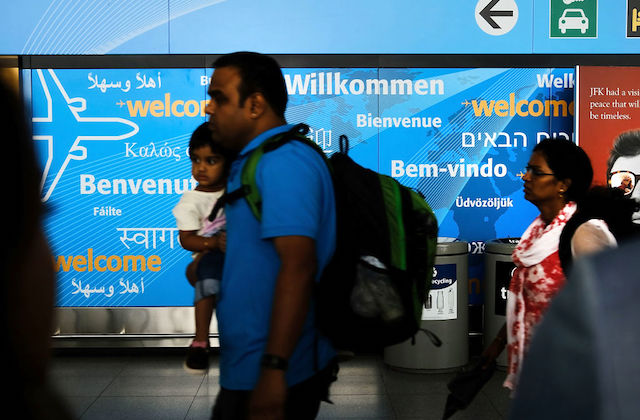On June 26, the Supreme Court partially lifted injunctions that previously prevented President Donald Trump from implementing his 120-day suspension of the federal refugee program and 90-day travel ban on nationals from six predominantly Muslim countries (Iran, Libya, Somalia, Sudan, Syria and Yemen).
The court’s opinion allowed for travel for “foreign nationals who have a credible claim of a bona fide relationship with a person or entity in the United States,” and left it up to the government to define “bona fide.” The resulting definition named foreign nationals with the following family members in the United States as acceptable for travel: “a parent (including parent-in-law), spouse, child, adult son or daughter, son-in-law, daughter-in-law, sibling, whether whole or half.” The definition specifically excludes “grandparents, grandchildren, aunts, uncles, nieces, nephews, cousins, brothers-in-laws and sisters-in-law, fiancés and any other ‘extended’ family members.”
Per The Washington Post, Hawaii-based U.S.District Judge Derrick K. Watson ruled on July 13 that the list of people who are permitted for travel is not supported by the SCOTUS decision, the law or real life, writing, “common sense, for instance, dictates that close family members be defined to include grandparents. Indeed, grandparents are the epitome of close family members. The government’s definition excludes them. That simply cannot be.”
He ordered that “grandparents, grandchildren, brothers-in-law, sisters-in-law, aunts, uncles, nieces, nephews and cousins of persons in the United States” must be allowed to travel to the U.S. He also added to the definition of bona fide as it relates to people with relationships to U.S. entities to include refugees who “have a formal assurance from an agency within the United States that the agency will provide, or ensure the provision of, reception and placement services to that refugee; or are in the U.S. Refugee Admissions Program through the Lautenberg Program.”
The Trump Administration again turned to the Supreme Court for clarity and requested a stay on Watson’s injunction. Today (July 19), the court decided that the government must in fact expand its definition of acceptable travelers, per Watson’s ruling. The unsigned order reads, in its entirety:
The government’s motion seeking clarification of our order of June 26, 2017, is denied. The district court order modifying the preliminary injunction with respect to refugees covered by a formal assurance is stayed pending resolution of the government’s appeal to the Court of Appeals for the Ninth Circuit. Justice Thomas, Justice Alito, and Justice Gorsuch would have stayed the District Court order in its entirety.
Both the United States Court of Appeals for the Fourth Circuit and United States Court of Appeals for the Ninth Circuit, have previously ruled that President Donald Trump’s “Muslim ban” is discriminatory and that President Donald Trump overreached the boundaries of his power when he set immigration policy. SCOTUS will hear arguments on these matters in October.
